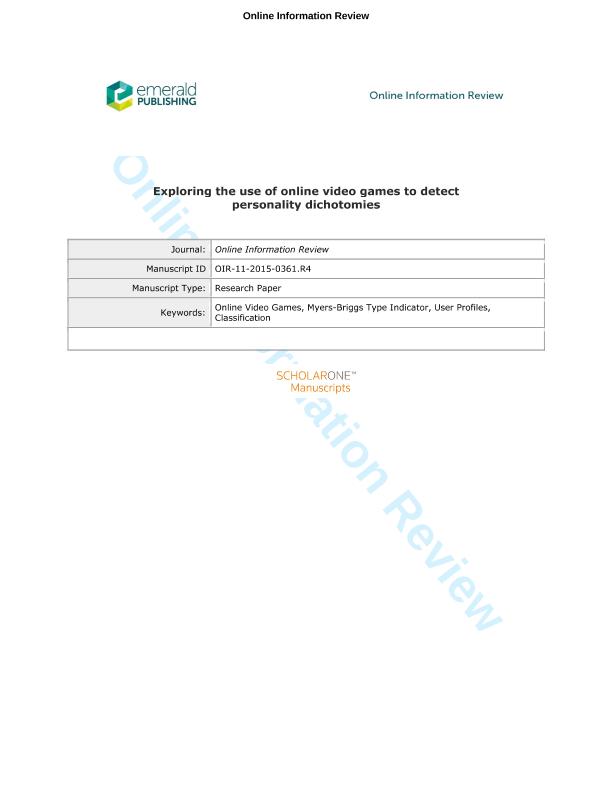Mostrar el registro sencillo del ítem
dc.contributor.author
Feldman, Juan

dc.contributor.author
Monteserin, Ariel José

dc.contributor.author
Amandi, Analia Adriana

dc.date.available
2018-11-23T17:17:16Z
dc.date.issued
2017-02
dc.identifier.citation
Feldman, Juan; Monteserin, Ariel José; Amandi, Analia Adriana; Exploring the use of online video games to detect personality dichotomies; Emerald; Online Information Review; 41; 5; 2-2017; 598-610
dc.identifier.issn
1468-4527
dc.identifier.uri
http://hdl.handle.net/11336/65006
dc.description.abstract
Purpose - Personality trait detection is a problem that has been gaining much attention in the computer science field recently. By leveraging users' personality knowledge software applications are able to adapt their behaviour accordingly. To detect personality traits automatically users must substantially interact with software applications to gather enough information that describe their behaviour. For addressing this limitation, the authors explore the use of online video games as an alternative approach to detect personality dichotomies. The paper aims to discuss these issues. Design/methodology/approach - The authors analyse the use of several online video games that exhibit features related with Myers-Briggs sensitive-intuitive personality dichotomy. Then, the authors build a user profile that describes users' behaviour when interacting with online video games. Finally, the authors identify users' personality by analysing their profile with different classification algorithms. Findings - The results show that games that obtained better results in the personality dichotomy detection exhibit features that had better match with the sensitive-intuitive dichotomy preferences. Moreover, the results show that the classification algorithms should satisfactorily deal with unbalanced data sets, since it is natural that the frequencies of the dichotomies types are unbalanced. In addition, in the context of personality trait detection, online video games possess several advantages over other type of software applications. By using games, users do not need to have previous experience, since they learn how to play during gameplay. Furthermore, the information and time needed to predict the sensitive-intuitive dichotomy using games is little. Originality/value - This study shows that online video games are a promising environment in which the users' personality dichotomies can be detected.
dc.format
application/pdf
dc.language.iso
eng
dc.publisher
Emerald

dc.rights
info:eu-repo/semantics/openAccess
dc.rights.uri
https://creativecommons.org/licenses/by-nc-sa/2.5/ar/
dc.subject
Classification
dc.subject
Myers-Briggs Type Indicator
dc.subject
Online Video Games
dc.subject
User Profiles
dc.subject.classification
Ciencias de la Computación

dc.subject.classification
Ciencias de la Computación e Información

dc.subject.classification
CIENCIAS NATURALES Y EXACTAS

dc.title
Exploring the use of online video games to detect personality dichotomies
dc.type
info:eu-repo/semantics/article
dc.type
info:ar-repo/semantics/artículo
dc.type
info:eu-repo/semantics/publishedVersion
dc.date.updated
2018-10-23T18:12:05Z
dc.journal.volume
41
dc.journal.number
5
dc.journal.pagination
598-610
dc.journal.pais
Reino Unido

dc.description.fil
Fil: Feldman, Juan. Consejo Nacional de Investigaciones Científicas y Técnicas. Centro Científico Tecnológico Conicet - Tandil. Instituto Superior de Ingeniería del Software. Universidad Nacional del Centro de la Provincia de Buenos Aires. Instituto Superior de Ingeniería del Software; Argentina
dc.description.fil
Fil: Monteserin, Ariel José. Consejo Nacional de Investigaciones Científicas y Técnicas. Centro Científico Tecnológico Conicet - Tandil. Instituto Superior de Ingeniería del Software. Universidad Nacional del Centro de la Provincia de Buenos Aires. Instituto Superior de Ingeniería del Software; Argentina
dc.description.fil
Fil: Amandi, Analia Adriana. Consejo Nacional de Investigaciones Científicas y Técnicas. Centro Científico Tecnológico Conicet - Tandil. Instituto Superior de Ingeniería del Software. Universidad Nacional del Centro de la Provincia de Buenos Aires. Instituto Superior de Ingeniería del Software; Argentina
dc.journal.title
Online Information Review

dc.relation.alternativeid
info:eu-repo/semantics/altIdentifier/doi/https://doi.org/10.1108/OIR-11-2015-0361
dc.relation.alternativeid
info:eu-repo/semantics/altIdentifier/url/https://www.emeraldinsight.com/doi/abs/10.1108/OIR-11-2015-0361
Archivos asociados
